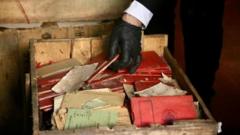Workers clearing out the Supreme Court's basement unearthed crates filled with Nazi documents, originally sent from Japan in 1941, prompting investigations into Argentina's connections with the Nazi regime during World War II.
Discovery of Nazi-Era Documents in Argentina's Supreme Court Basement

Discovery of Nazi-Era Documents in Argentina's Supreme Court Basement
Crates containing Nazi propaganda materials were discovered in a basement of Argentina's Supreme Court, shedding light on the country's historical ties to the regime.
In a startling revelation, workers cleaning the basement of Argentina's Supreme Court stumbled upon crates packed with documents linked to Nazi Germany. The discovery occurred while preparations were underway to relocate archival materials to a newly established museum. According to the court, these documents arrived in Argentina on June 20, 1941, sent from the German embassy in Tokyo in 83 diplomatic pouches aboard a Japanese steamship.
Amidst their efforts, workers found several wooden crates, including one that, when opened, revealed material aimed at bolstering Adolf Hitler’s ideology within Argentina during World War II. The crates have now been transferred to a secure office, and court officials have reached out to the Buenos Aires Holocaust Museum for assistance in cataloging the documents.
Among the items found were black-and-white photographs, membership booklets featuring swastikas, and other propaganda materials. Historians are optimistic that these documents may provide insights into Nazi Germany's financial networks and their overseas connections.
Initial investigations indicate that the shipment was declared as "personal effects" by the German embassy in Buenos Aires. However, Argentine customs officials grew suspicious about the volume of the cargo, leading to five random pouches being opened, which subsequently revealed postcards and Nazi propaganda. Following these discoveries, the German embassy sought to have the pouches returned to Tokyo, but the Argentine government intervened.
In September 1941, an Argentine judge ordered the confiscation of all 83 pouches. The Supreme Court was assigned the responsibility of determining their fate, but it appears no action was taken before 1944, when Argentina severed relations with the Axis powers, resulting in the crates being left untouched in the basement for decades.
After World War II, Argentina became a haven for numerous high-ranking Nazis, including notorious figures like Adolf Eichmann and Josef Mengele, fostering ongoing scrutiny over the country’s historical role. In 2000, then-President Fernando de la Rúa issued an apology for Argentina’s past in sheltering Nazi war criminals, underscoring the enduring legacy of this dark chapter in history.




















